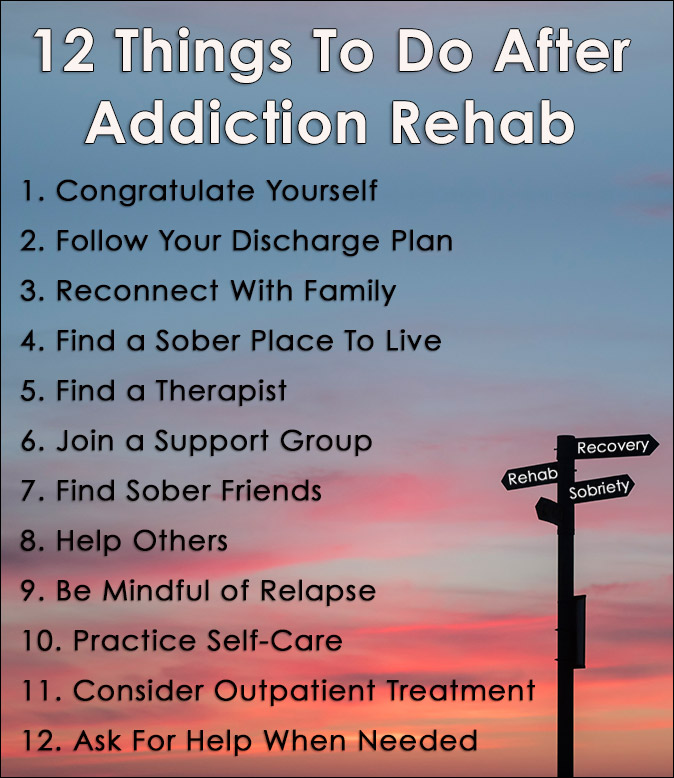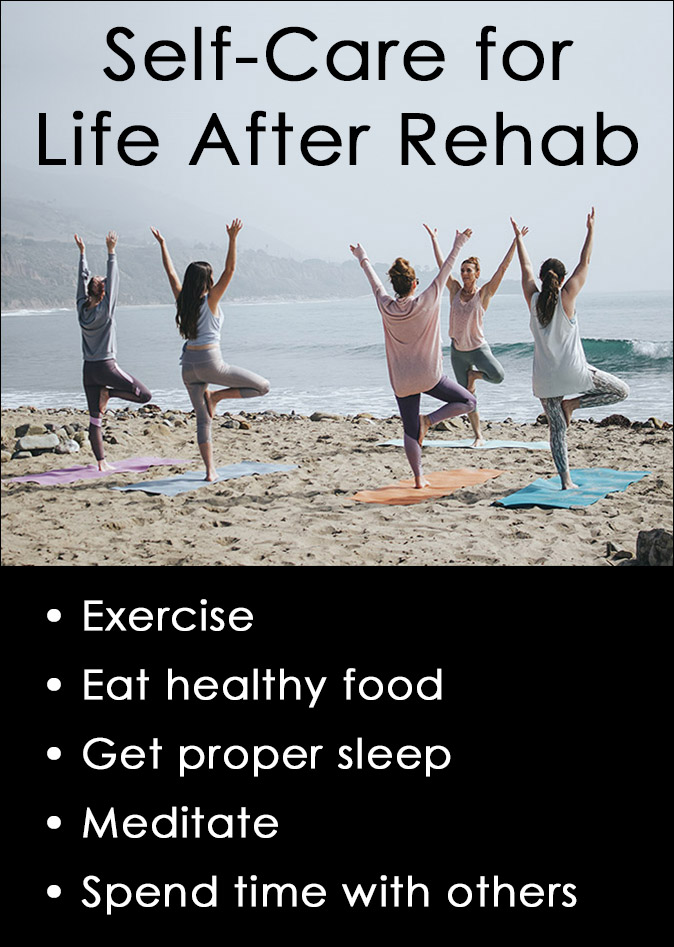
Most people agree that completing an addiction treatment program can be difficult, but it is ultimately worth it. And learning ways to improve life after rehab forms the foundation for a long-lasting recovery.
Seeking treatment for a substance use disorder for alcohol, drugs, or a combination of both is often one of the hardest decisions a person must make.
Because addiction is so complex, some people may need to make that choice more than once. This is why it’s necessary to know what to do after rehab to reduce the chance of a relapse and a successful, productive, and happy life in recovery.
The most effective way to treat a substance use disorder and underlying conditions like depression or anxiety related to addiction is a professional drug and alcohol recovery treatment program.
Unfortunately, far too many people will never get the help they need and deserve. The National Survey on Drug Use and Health (NSDUH) reports it is common that people who need treatment will never actually attend rehab.
Sometimes a lack of access to recovery resources is a factor for why people don’t get the help they need.
Other people who need addiction treatment make excuses to avoid rehab and simply refuse to go because they don’t think they have a problem for a variety of reasons.
Addiction treatment provides structure, safety, and support. Depending on the severity of a person’s condition, they may need to detox in a safe medical setting to overcome a physical or psychological dependence and ease uncomfortable withdrawal symptoms.
Having access to supporting counselors and therapists can help facilitate and guide patients toward success in recovery.
In truth, making the commitment to seek treatment and focus on recovery will be one of the most rewarding decisions a person with an addiction to drugs or alcohol will ever make.
Protecting one’s recovery after completing treatment then becomes the next phase, which is why it’s important to learn how to prepare for life after rehab.

12 Ways to Enhance Life After Rehab
1. Congratulate Yourself
At times, life after rehab can be challenging. But making a difficult choice to complete treatment means you are better equipped to stay sober and healthy.
That deserves a heartfelt acknowledgement, so take a victory lap. Congratulate yourself for this accomplishment and be mindful of how it feels.
If challenges down the road appear, remember you are strong enough to overcome them.
2. Follow Your Recommended Discharge Plan
Sometimes called an “exit plan” or a “recovery plan,” a discharge plan is a blueprint that outlines how to prepare for life after rehab.
A well-designed discharge plan should include recommendations from your treatment team and scheduled follow-ups, along with support information and contact numbers.
3. Reconnect With Family
With addiction, the people we inadvertently hurt the most are those that care about us dearly – our families. Life after rehab treatment is the perfect time to reach out to family and friends who we may have hurt to explain our recovery.
This may include a conversation about how we hurt them and, if appropriate, apologizing for that. It is also a good time to tell them that we want their support and love as we work to heal.
4. Find a Sober, Safe, and Stable Place to Live
While some people who attend rehab may be able to return home after treatment, others cannot. This is because “home” may have been a toxic or chaotic environment that is not conducive to lasting recovery.
Some well-established treatment centers provide access to sober living homes, but even if they don’t offer that, many will help their outgoing patients find suitable housing in clean living communities or other legitimate housing programs.
5. Find a Therapist for Life After Rehab
The length of time a person spends in treatment will vary, usually between 30 to 90 days. While that might sound like a long time, it’s really just the beginning of a recovery process that needs to continue.
Arranging to see a therapist on a regular basis before fully completing rehab is an excellent way to start life in a more independent setting.
A well-suited therapist should be familiar with the recovery process and may even be the same person a patient saw while in rehab, or one referred to them by their treatment team.
6. Join a Support Group and Attend Meetings
Support groups, whether they are organizations like Alcoholics Anonymous, Narcotics Anonymous, or non-religious, science-based groups like SMART Recovery Groups can be vitally important for recovery.
First, attending support group meetings provides people in recovery with clear and present evidence that they are not alone in struggling with an addiction that many people don’t understand.
Second, being involved in a support group and having the opportunity to share ongoing challenges and being heard can decrease the chances of relapse.
There is also another important key reason to attend support group meetings, which brings us to number 7…
7. Find Sober Friends for Life After Rehab
Finding a likeminded community of sober people and developing relationships with others in recovery can lead to a richer, fuller life after rehab, and one where there is a lot of available support.
Many people exiting rehab realize that if they plan to stay sober, they will not be able to return to some of the friends they once spent the most time with – the people they “partied” with.
Making new sober friends is harder for some people than for others and that’s understandable because every person is different. But attending support groups is a good first step at being open to new, and healthier, sober-based relationships.
8. Help Others
Learning to help others is a great way to “take ourselves out of the equation.” It’s hard to avoid patterns of negative self-talk that make us feel bad about ourselves in recovery.
We might not even recognize that we’re doing it at first, but learning to spot the cycle early can take away its power and reduce the chances of having a relapse.
Helping others, either through volunteer organizations, setting up and breaking down support group meetings, or even listening to a sober friend who desperately needs to talk are all ways to stay “out of the way” of our own recovery.
Providing others with a helping hand and cultivating a positive force in the world will make you feel good about yourself and others.
In truth, this is what we are actually doing when we take the time to be of service to others.
9. Be Mindful of Relapse Triggers
Giving in to a pattern of negative self-talk can be a sign that relapse might not be far off. If it continues, people in recovery often find themselves visiting the people or places where they previously used drugs and alcohol.
Other signs might be a lack of motivation to attend meetings, see a therapist, or deal with periods of unmanaged depression.
The takeaway is that it might not be one single thing that leads to relapse. Instead, it could be a series of thoughts, events, or poor choices that lead to a relapse.
Being able to recognize the early signs and seek support can be an incredibly powerful tool for relapse prevention.
10. Practice Self-Care and Good Mental Health Habits
Practicing self-care is an ideal way to be good to yourself and will ultimately help protect your recovery.
Self-care can be as simple as exercising regularly, eating healthy foods, meditating, and getting better sleep.
This is sometimes easier said than done, but since you tackled treatment, you’re already moving in the right direction.
11. Consider Outpatient Treatment
For some people, exiting treatment after 30 or 90 days might feel like it’s too soon. Others may still need the built-in structure and support provided during rehab.
Outpatient treatment is generally considered a step-down from being in a full-time residential treatment facility. But it still provides one-on-one counseling sessions, support groups, and other activities that deepen a person’s roots and foundation in recovery.
PHP and IOP outpatient treatment is a positive way to fill the gap between leaving residential treatment and living a more independent life in recovery.
12. Ask For Help if Needed to Keep Your Life After Rehab on Track
Life after rehab will certainly come with challenges that can shake the foundation of everything a person has worked for during recovery.
These struggles will usually come early in sobriety, but no matter how much time a person has been sober, trouble can occur at any time.
Knowing that it’s okay to ask for help is vital for lasting recovery. For some people, this might simply mean increasing the number of meetings they attend.
For others, finding an outpatient program or returning to residential rehab treatment is necessary.
The most important point is to not be afraid or ashamed to ask for help regardless of what stage of recovery you’re in.
Hopefully these recommendations for life after rehab will make the transition to sobriety a successful and rewarding path to a lasting recovery.

The Importance of Self-Care for Life After Rehab
There are many reasons why self-care is necessary for life after rehab.
Most people who struggle with addiction spend much of their time focused on their substance use. This causes physical and mental health to take a backseat to drugs and alcohol.
But as mentioned earlier, exercise, eating healthy food, and proper sleep are easy to do and can dramatically improve the way we feel physically and mentally.
Getting regular exercise naturally boosts happy hormones in the brain to enhance mood and happiness.
Exercise has also shown to be just as effective as medications for some mental health issues and it’s a healthy substitute for drugs or alcohol.
Eating healthy food and adopting a no sugar diet is just as good for the body as it is for the brain. A healthy diet also fits nicely with a regular exercise routine.
Combining regular exercise with eating the right foods promotes better sleep to create a strong foundation for strengthening overall health and wellbeing.
Healthy food and exercise naturally increase serotonin production in the brain and body, which is a neurotransmitter responsible for regulating sleep, mood, and mental health.
With exercise, sleep, and diet under control, it becomes easier to focus on other self-care activities like practicing meditation, organizing your life after rehab, and spending time with others.
Making small lifestyle changes a little at a time all add up to big dividends in the way we feel physically and emotionally.
Over time, not only do they get easier, but they also produce bigger gains to ensure a healthy life after rehab.
Related Posts
- 10 Questions to Ask When Searching for Addiction Rehab
Searching for the perfect addiction rehab can be overwhelming for most people. Whether you’re searching…
- 8 Famous People Who Kicked Their Cocaine Addiction
People are often influenced by the rich and famous, and sadly that can mean normalizing…
- Is Addiction a Disease or a Choice?
Is addiction a disease? Is alcoholism genetic? Or is it simply a personal choice? These…
